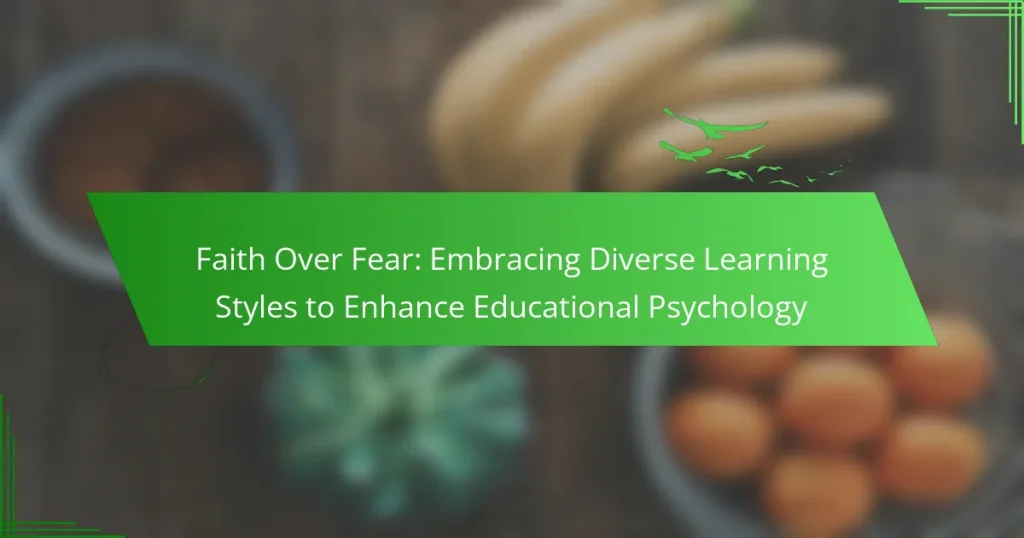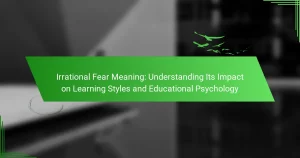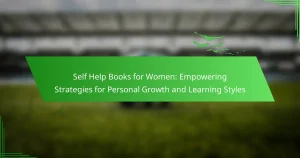Embracing diverse learning styles enhances educational psychology by accommodating individual differences in information processing. This approach fosters engagement, improves retention, and supports various cognitive strategies. By integrating tailored teaching methods and regular assessments, educators can create a more inclusive and effective learning environment. Recognising and adapting to these styles significantly boosts student motivation and academic achievement.
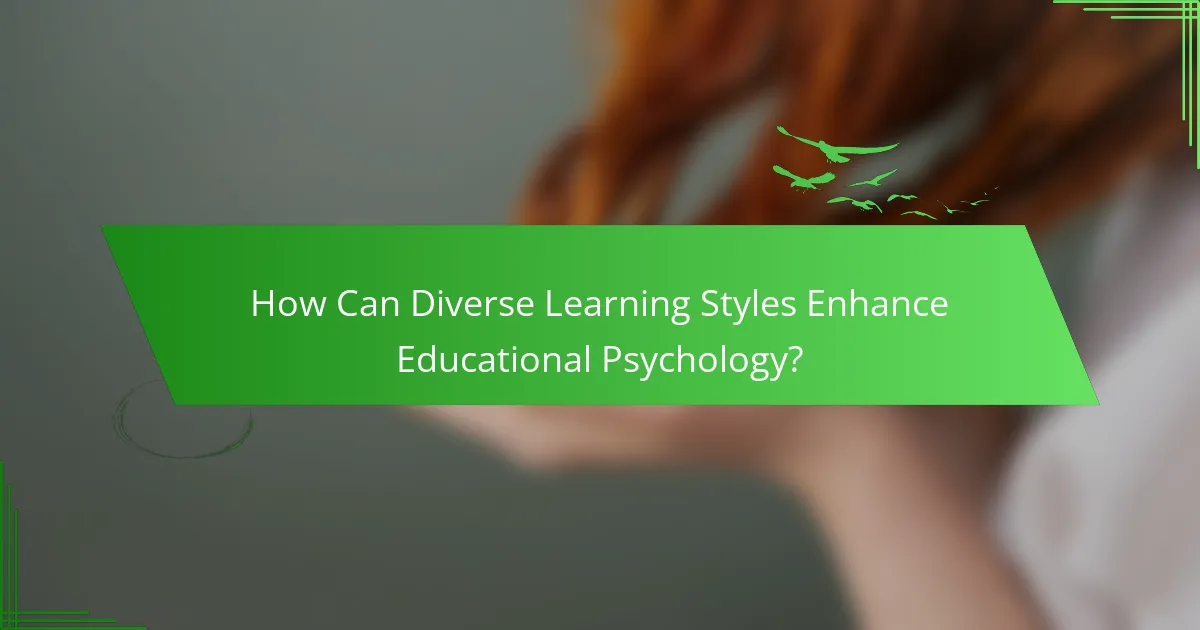
How Can Diverse Learning Styles Enhance Educational Psychology?
Diverse learning styles enhance educational psychology by accommodating individual differences in how students process information. This inclusivity fosters engagement, improves retention, and supports various cognitive approaches. Tailoring educational methods to diverse styles can lead to higher academic achievement and personal growth. Research shows that when educators recognise and adapt to these styles, student motivation increases significantly, resulting in a more effective learning environment.
What Are the Key Learning Styles Recognised in Educational Psychology?
The key learning styles recognised in educational psychology include visual, auditory, and kinesthetic. Each style addresses unique preferences in how individuals absorb and process information. Visual learners benefit from diagrams and charts, auditory learners excel with discussions and lectures, and kinesthetic learners thrive through hands-on activities. Understanding these styles enhances teaching effectiveness and student engagement.
How Do Visual Learners Absorb Information Effectively?
Visual learners effectively absorb information through visual aids, such as diagrams, charts, and videos. These tools enhance understanding by presenting concepts in a clear, engaging manner. Visual learners benefit from colour coding, mind maps, and infographics, which help organise information visually. Incorporating these strategies into educational psychology can significantly improve retention and comprehension for this learning style.
What Techniques Benefit Auditory Learners?
Auditory learners benefit from techniques that engage their listening skills. Effective methods include using audio recordings, group discussions, and verbal instructions. These approaches enhance retention and understanding, making learning more effective for auditory learners. Engaging storytelling can also reinforce concepts, providing a unique attribute that caters specifically to their learning style.
How Do Kinesthetic Learners Engage with Material?
Kinesthetic learners engage with material through hands-on activities, movement, and real-life experiences. They thrive in environments that allow them to manipulate objects and participate actively in their learning process. This engagement enhances retention and understanding, making learning more effective. For example, using role-play or simulations can significantly improve their grasp of complex concepts.
What Universal Benefits Do Diverse Learning Styles Offer?
Diverse learning styles offer significant universal benefits, enhancing educational outcomes and fostering inclusive environments. These benefits include improved engagement, tailored teaching methods, and increased retention of information. By embracing various learning styles, educators can address unique student needs, promoting a deeper understanding of material. This approach cultivates a supportive atmosphere where all learners thrive, ultimately leading to academic success.
How Can Individualised Learning Approaches Improve Outcomes?
Individualised learning approaches significantly enhance educational outcomes by catering to diverse learning styles. These methods allow students to engage with material in ways that resonate with their unique cognitive preferences, fostering deeper understanding and retention.
Research shows that tailored instruction can lead to improved academic performance. For instance, students who learn through visual aids may grasp complex concepts more effectively than through traditional lectures. This adaptability addresses the root attribute of personalised education, ensuring that each learner’s strengths are recognised and utilised.
Additionally, individualised approaches can reduce anxiety and increase motivation. When learners see their preferred styles integrated into the curriculum, they feel more confident and invested in their education. This shift from fear to faith in their abilities can transform the educational experience.
Ultimately, embracing diverse learning styles through individualised approaches not only enhances educational psychology but also equips students with the skills necessary for lifelong learning.
What Role Does Engagement Play in Learning Effectiveness?
Engagement significantly enhances learning effectiveness by fostering deeper understanding and retention. Active participation in diverse learning styles, such as visual, auditory, and kinesthetic, caters to individual preferences, promoting a more inclusive educational environment. Studies show that engaged learners demonstrate improved academic performance and motivation, as they are more likely to connect with the material. Incorporating varied teaching methods can lead to a unique attribute of increased cognitive flexibility, allowing students to adapt their learning strategies effectively.
What Unique Challenges Arise from Embracing Diverse Learning Styles?
Embracing diverse learning styles presents challenges such as resistance to change, resource allocation, and assessment difficulties. Teachers may struggle to adapt their methods, leading to inconsistent educational experiences. Additionally, implementing varied instructional strategies requires significant training and support. Balancing these approaches can enhance educational psychology by fostering inclusivity and engagement.
How Can Educators Address Misconceptions About Learning Styles?
Educators can address misconceptions about learning styles by promoting a growth mindset and emphasising evidence-based practices. They should encourage flexibility in teaching methods to accommodate diverse learning preferences. Research shows that understanding individual learning differences enhances student engagement and achievement. Additionally, integrating collaborative activities fosters peer learning, which can clarify misconceptions and support diverse educational approaches.
What Are the Implications of Stereotyping Learning Styles?
Stereotyping learning styles can lead to misconceptions that hinder educational development. It limits the recognition of individual differences and can result in ineffective teaching strategies. Embracing diverse learning styles enhances educational psychology by promoting inclusivity and adaptability. This approach recognises that students possess unique attributes, such as cognitive preferences and emotional responses, which influence their learning processes. By valuing these differences, educators can create tailored experiences that foster engagement and improve academic outcomes.
What Rare Attributes Make Certain Learning Styles Stand Out?
Certain learning styles stand out due to their unique attributes, such as adaptability, sensory engagement, and collaborative tendencies. These rare attributes enable learners to thrive in diverse educational environments. For example, kinesthetic learners often utilise movement to enhance retention, while visual learners may excel through imagery and diagrams. Embracing these distinctive styles fosters a more inclusive and effective educational psychology framework.
How Does Cultural Background Influence Learning Preferences?
Cultural background significantly shapes learning preferences by influencing values, communication styles, and approaches to education. For instance, collectivist cultures often emphasise group learning, while individualistic cultures may favour independent study. Research indicates that culturally responsive teaching enhances student engagement and achievement, as it aligns educational practices with students’ backgrounds. Understanding these dynamics enables educators to tailor their methods, fostering an inclusive learning environment that respects diverse perspectives.
What Innovations in Technology Support Diverse Learning Styles?
Innovations in technology significantly enhance diverse learning styles by providing tailored educational experiences. Adaptive learning platforms adjust content based on individual progress, catering to visual, auditory, and kinesthetic learners. Gamification engages students through interactive elements, fostering motivation and retention. Virtual and augmented reality offer immersive experiences, allowing experiential learning that appeals to various preferences. Collaborative tools enable peer interaction, supporting social learning dynamics. These technological advancements create inclusive environments that respect and nurture different learning modalities.
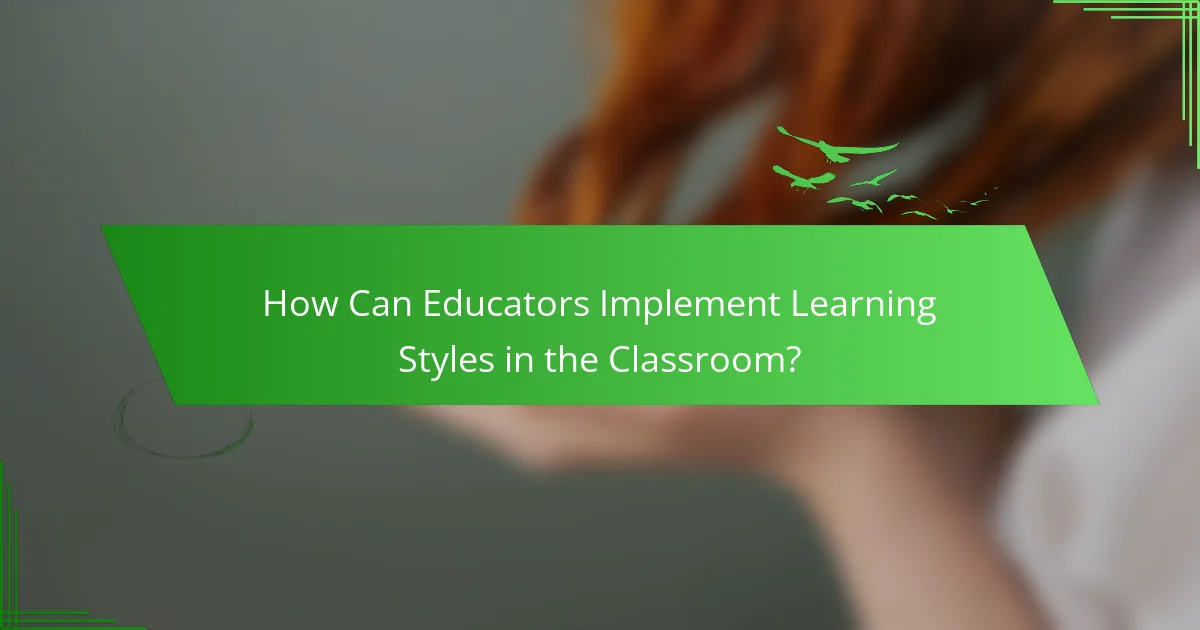
How Can Educators Implement Learning Styles in the Classroom?
Educators can implement learning styles by integrating diverse teaching methods tailored to individual preferences. This approach enhances engagement and retention. For instance, visual aids can support visual learners, while hands-on activities benefit kinesthetic learners. Regular assessments can help identify students’ preferred styles, enabling personalised instruction that fosters a supportive learning environment. Embracing these diverse learning styles ultimately promotes a more inclusive educational psychology.
What Strategies Foster an Inclusive Learning Environment?
Creating an inclusive learning environment involves strategies that embrace diverse learning styles. Effective approaches include differentiated instruction, collaborative learning, and culturally responsive teaching.
Differentiated instruction tailors teaching methods to accommodate various learning preferences, ensuring all students engage meaningfully. Collaborative learning fosters peer interaction, allowing students to learn from each other’s perspectives. Culturally responsive teaching integrates students’ cultural backgrounds into the curriculum, enhancing relevance and connection.
Research indicates that inclusive strategies improve student engagement and academic success. For instance, schools implementing these practices report increased participation and higher achievement levels across diverse student groups.
How Can Teachers Adapt Their Teaching Methods for Different Styles?
Teachers can adapt their methods by recognising and incorporating diverse learning styles. This approach enhances educational psychology by fostering an inclusive environment.
First, teachers should identify the various learning styles present in their classrooms, such as visual, auditory, and kinesthetic. For example, visual learners benefit from diagrams and charts, while auditory learners excel with discussions and lectures.
Next, employing a mix of teaching strategies can engage all students. This may include using multimedia presentations, group projects, and hands-on activities. As a result, students are more likely to grasp complex concepts.
Additionally, ongoing assessment of student understanding allows teachers to adjust their methods accordingly. By gathering feedback, educators can refine their approaches to meet the unique needs of their students effectively.
What Role Do Collaborative Learning Experiences Play?
Collaborative learning experiences enhance educational psychology by fostering diverse learning styles. They promote engagement, critical thinking, and social interaction among students. As a result, learners develop a deeper understanding of concepts and improved problem-solving skills. Collaborative approaches cater to unique attributes of individual learners, allowing for personalised growth and increased motivation.
What Best Practices Should Educators Follow When Embracing Diversity?
Educators should prioritise inclusive teaching strategies that recognise and celebrate diverse learning styles. These strategies enhance educational psychology by fostering an environment where all students feel valued and understood.
1. **Implement Differentiated Instruction**: Tailor lessons to accommodate various learning preferences, ensuring every student can engage with the material effectively.
2. **Foster a Culturally Responsive Classroom**: Incorporate diverse perspectives and materials that reflect the backgrounds of all students, promoting connection and relevance.
3. **Encourage Collaborative Learning**: Utilise group activities that allow students to learn from each other, enhancing social skills and understanding of different viewpoints.
4. **Utilise Formative Assessments**: Regularly assess students’ progress through varied methods, adjusting teaching approaches based on individual needs and feedback.
How Can Continuous Assessment Improve Adaptation to Learning Styles?
Continuous assessment enhances adaptation to learning styles by providing real-time feedback and personalised learning experiences. This approach allows educators to identify individual strengths and weaknesses, tailoring instruction to meet diverse needs. By fostering a growth mindset, continuous assessment encourages students to engage actively in their learning process. Research indicates that students who receive ongoing feedback show improved academic performance and motivation. This method supports the unique attribute of educational psychology, which emphasises the significance of understanding individual learning preferences.
What Common Mistakes Should Educators Avoid in Implementation?
Educators should avoid common mistakes such as neglecting diverse learning styles, failing to provide adequate feedback, and overlooking the importance of a supportive environment. Recognising and accommodating different learning preferences enhances educational psychology. For instance, implementing varied teaching methods fosters engagement and retention. Additionally, clear communication of expectations and constructive feedback are crucial for student growth. Lastly, creating a safe space for expression encourages participation and collaboration.
What Expert Insights Can Guide the Integration of Learning Styles?
Diverse learning styles can be integrated effectively by recognising individual preferences and adapting teaching methods accordingly. Emphasising faith over fear encourages educators to embrace innovative strategies tailored to varied learning needs. Research indicates that personalised approaches enhance student engagement and retention. Utilising assessments to identify learning styles can lead to more effective educational outcomes. Collaborative learning environments further support diverse learners by fostering peer interactions that respect different styles.
What Research Supports the Effectiveness of Diverse Learning Approaches?
Research supports that diverse learning approaches significantly enhance educational psychology by accommodating varied cognitive styles. Studies indicate that students engaged through multiple modalities show improved retention and understanding. For instance, a meta-analysis found that using visual, auditory, and kinesthetic methods increased student performance by up to 30%. Additionally, incorporating diverse strategies fosters a more inclusive environment, catering to unique learner needs. This adaptability not only boosts academic outcomes but also promotes emotional well-being, as students feel more connected and supported in their learning journeys.
How Can Educators Stay Informed About Emerging Trends in Learning Styles?
Educators can stay informed about emerging trends in learning styles by engaging in continuous professional development. Participating in workshops, webinars, and conferences allows educators to learn from experts and peers. Subscribing to educational journals and blogs provides insights into the latest research and methodologies. Collaborating with colleagues fosters an exchange of ideas and practices that embrace diverse learning styles. Utilising online platforms and social media helps educators connect with thought leaders and access a wider range of resources.
